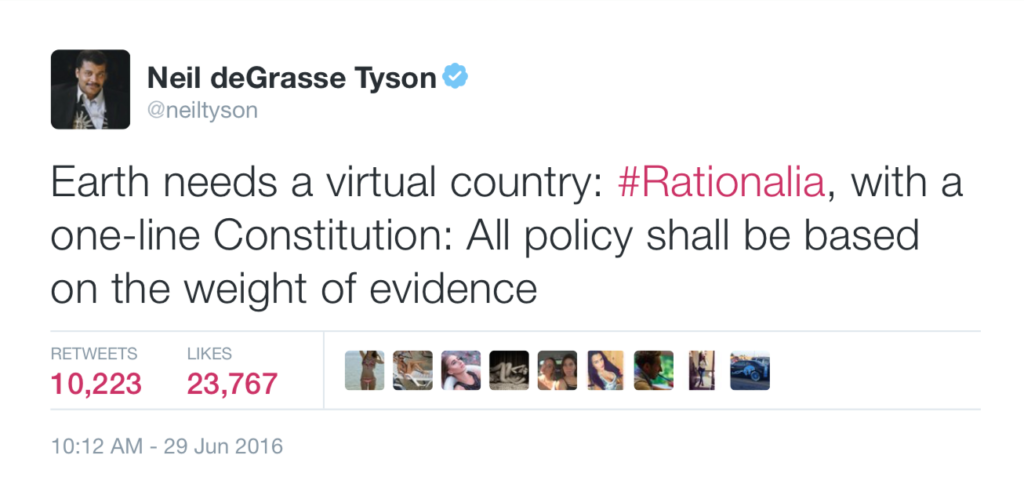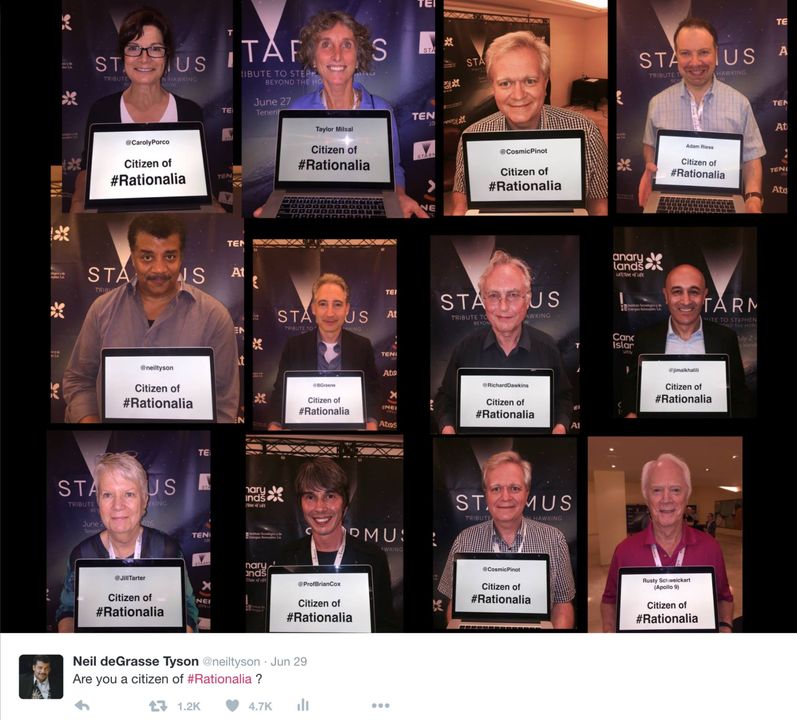
After this Twitter posting several weeks ago, I was intrigued by how many organizations and media outlets hated the idea, being sure that a country founded on evidence and rational thinking would be a “terrible” place. Some examples:
- US News and World Report
Neil deGrasse Tyson May Dream of a ‘Rationalia’ Society, But It’s a Fallacy - New Scientist
A rational nation ruled by science would be a terrible idea - Slate
History (and Logic) Explains Why Neil deGrasse Tyson’s Proposed Rational Nation Is a Terrible Idea - The Federalist
Neil deGrasse Tyson’s ‘Rationalia’ Would Be A Terrible Country - Arts Journal
Sorry, Neil deGrasse Tyson, Basing A Country’s Governance Solely On The “Weight of Evidence” Could Not Work
A common critique was the question of where such a country would get its morals, and how other ethical issues might be established or resolved.
The last I reviewed the US Bill of Rights, there was no discussion of morals there either. Nowhere does it say “Thou Shalt Not Kill.” Meanwhile, there’s an entire Amendment—Number 3—that prevents the military from bunking in your home without your permission.
Also consider that across time and culture, morals have evolved, typically by rational analysis of the effects and consequences of a previously held moral, in the light of emergent knowledge, wisdom, and insight. The Bible, for example, is not a fertile place to find anti-slavery commentary, nor discussions of the equality of women.
Consider further that the original Tweet specifically references Policy, which can itself become laws, but more broadly, Policy sets frameworks for thinking about laws. Examples of Policy would be a government’s choice to invest in R&D, and if so, by how much. Or whether a government should help the poor, and if so, in what ways. Or how much a municipality should support equal access to education. Or whether or not tariffs should be levied on goods and services from one country or another. Or what tax rate should be established, and on what kinds of income. Often these policies stall between political factions arguing loudly that they are right and their opponent is wrong, which reminds me of the mostly-true adage: “if an argument lasts longer than five minutes then both sides are wrong.”
Unlike what typically occurs between adversarial politicians, in scientific discourse, when we disagree with one another there’s an underlying premise: Either I’m wrong and you’re right; you’re wrong and I’m right; or we’re both wrong. The unfolding argument actually shapes the quest for more and better data to resolve the differences so that we can agree and then move on to the next unresolved problem.
In Rationalia, the Constitution stipulates that a body of convincing evidence needs to exist in support of an idea before any Policy can be based on it. In such a country, data gathering, careful observations, and experimentation would be happening all the time, influencing practically every aspect of our modern lives. As a result, Rationalia would lead the world in discovery because discovery would be built into the DNA of how the government operates, and how its citizens think.
In Rationalia, the sciences that study human behavior (psychology, sociology, neuroscience, anthropology, economics, etc.) would be heavily funded since much of our understanding of how we interact with one another derives from research within subfields of these disciplines. Because their subjects involve humans, these fields are particularly susceptible to social & cultural bias. So the verifiability of evidence will be of highest concern.
In Rationalia, since weight of evidence is built into the Constitution, everyone would be trained from an early age on how to obtain and analyze evidence, and how to draw conclusions from it.
In Rationalia, you would have complete freedom to be irrational. You just don’t have the freedom to base policy on your ideas if the weight of evidence does not support it. For this reason, Rationalia might just be the freest country in the world.
In Rationalia, for example, if you want to introduce capital punishment you’d need to propose a reason for it. If the reason is to deter murder, then an entire research machine would be put into place (if it did not already exist) to see whether, in fact, capital punishment deters murder. If it does not, then your proposed policy fails, and we move on to other proposals.
In Rationalia, if you want to fund art in schools, you simply propose a reason why. Does it increase creativity in the citizenry? Is creativity good for culture and society at large? Is creativity good for everyone no matter your chosen profession? These are testable questions. They just require verifiable research to establish answers. The debate then ends quickly in the face of evidence, and we move on to other questions.
In Rationalia, citizens would pity newscasters for presenting their opinions as facts. Everyone would have a heightened capacity to spot bullshit wherever and whenever it arose.
In Rationalia, a diverse, pluralistic land, you are free to practice religion. You would just have a hard-time basing policy on it. Policy, by most intended meanings of the word, are rules that apply to everyone, but most religions have rules that apply only to themselves.
In Rationalia, research in psychology and neuroscience would establish what level risks we are all willing to take, and how much freedom we might need to forfeit, in exchange for comfort, health, wealth, and security.
In Rationalia, you could create an Office of Morality, where moral codes are proposed and debated. What moral codes would the citizens of Rationalia embrace? That is, itself, a research project. Countries don’t always get it right, of course. And neither will Rationalia. Is slavery moral? The USA’s Constitution thought so for 76 years. Should women vote? The USA’s Constitution said no for 131 years.
If we learn later that Rationalia’s Constitution needs additional Amendments, then you can be sure there will be evidence in support of it.
Origin of Rationalia
My Tweet on Rationalia was followed by a photo-mosaic of ten people, plus me, declaring that we were citizens of this new, virtual country.

These ten people are:
- Brian Cox, Particle Physicist & Educator
- Richard Dawkins, Evolutional Biologist
- Brian Greene, Theoretical Physicist
- Jim al-Khalili, Physicist & Educator
- Taylor Milsal, Marketing Executive
- Carolyn Porco — spelled correctly here), Planetary Scientist. (her Twitter handle was misspelled in the image)
- Adam Riess, Astrophysicist and co-winner of the Nobel Prize in physics for discovering Dark Energy in the Universe
- Brian Schmidt, Astrophysicist, one-time co-author, co-winner of the Nobel Prize in physics for discovering Dark Energy in the universe. And, we suppose, a wine lover. In the rapidly assembled mosaic, he’s accidentally pictured twice.
- Rusty Schweikart, Apollo 9 Astronaut
- Jill Tarter, SETI Astrophysicist
The concept of Rationalia began when Taylor Milsal insightfully mentioned at a cocktail reception of the Starmus Science Festival in Spain’s Canary Islands (July 2016) that, perhaps, a new virtual country should be created: “Rational Land,” containing member states that, by and large, embrace rational thinking in their conduct and policies. This idea was prompted by how much irrational conduct currently drives world politics. We discussed what might be charter municipalities, biased of course towards those for which we were most familiar. This list began with the big cities London, Paris, and New York. The countries Switzerland. Denmark. The states of Massachusetts, Minnesota, and California. The conversation spread rapidly through the cocktail party. Each person adding a bit here and there to what Taylor started.
For me, the name “Rational Land,” didn’t roll off the tongue, so I suggested “Rationalia.” I also felt that annexing entire municipal populations was too inclusive, ignoring wildly irrational factions that may be operating within them. And so, after extensive discussion, primarily with Brian Cox and Jim al-Khalili, we instead embraced the individual’s choice of virtual citizenship, which happens to be ideal for social media. Taylor Milsal is not on Twitter, but had earlier made some mentions of Rational Land in other internet outlets. I posted the first Tweet with mention of Rationalia (reproduced above), containing Brian Cox’s clever addition of a one-line constitution.


